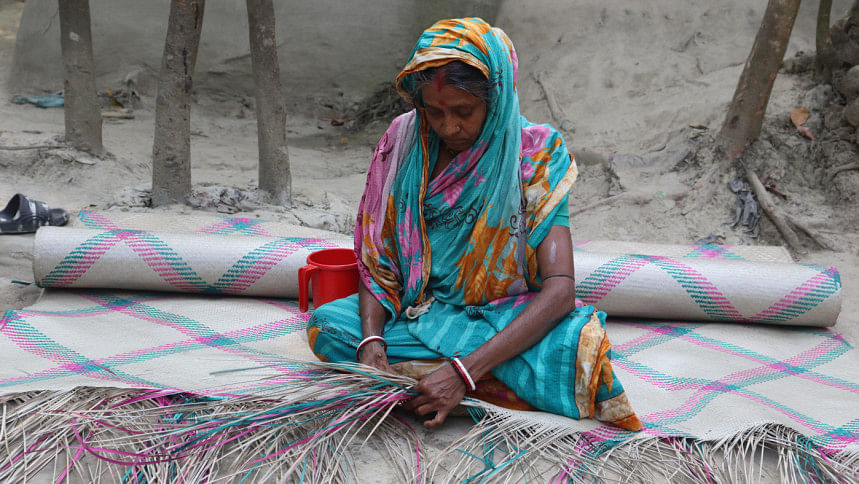Pirojpur shitalpati makers struggle to survive

For centuries, the Patikar community has earned its livelihood by making shitalpati, a type of floor mat woven from the leaf skin of the paitra plant. This traditional craft, rooted in heritage, is now under threat as the community in Kawkhali upazila of Pirojpur struggles to sustain the profession in the face of rising costs and dwindling demand.
Currently, around 45 families in Subidpur village are still engaged in making shitalpati, following in the footsteps of their forefathers. But many say survival is becoming increasingly difficult.
Patikars said the cost of raw materials has gone up significantly. Paitra, a shrub variety plant, is now sold at a high price, and overall production costs have also increased. Makers have to pay over Tk 7,000 for 20 bundles -- each containing 80 pieces -- of paitra, which yield a maximum of 25 floor mats. Additionally, other production expenses amount to around Tk 6,000. Depending on the quality, each mat sells for between Tk 600 and Tk 3,000.
Men primarily prepare the paitra skins, while women weave the mats.
Speaking about the current state of the trade, shitalpati maker Sukdeb Patikar said they can no longer make a reasonable profit, as production costs have soared and demand has declined.
"If we sell labour outside, we can earn more," he said.
Another artisan, Bikas Patikar, said selling the finished products is also a challenge. "As various electric cooling devices, including air conditioners, have become common, the demand for shitalpati has decreased compared to before," he said.
Basonti Patikar added that they remain involved in the craft because they have inherited the skills from their forefathers and have no other source of income.
"But our children are not willing to stay in the shitalpati business because of its poor prospects. They are looking for other jobs," she said.
Sankar Patikar noted that innovation could save the traditional craft. "We need training to produce new products from paitra leaves," he said.
Mat makers also mentioned that they do not have enough land to grow paitra themselves. If given access to government land on lease, they could cultivate their own plants and reduce production costs.
Hazra Siddiqur Rahman, deputy manager of Bangladesh Small and Cottage Industries Corporation (BSCIC) in Pirojpur, said that if the Patikars are interested, the office can help arrange loans to support their craft.

 For all latest news, follow The Daily Star's Google News channel.
For all latest news, follow The Daily Star's Google News channel. 



Comments